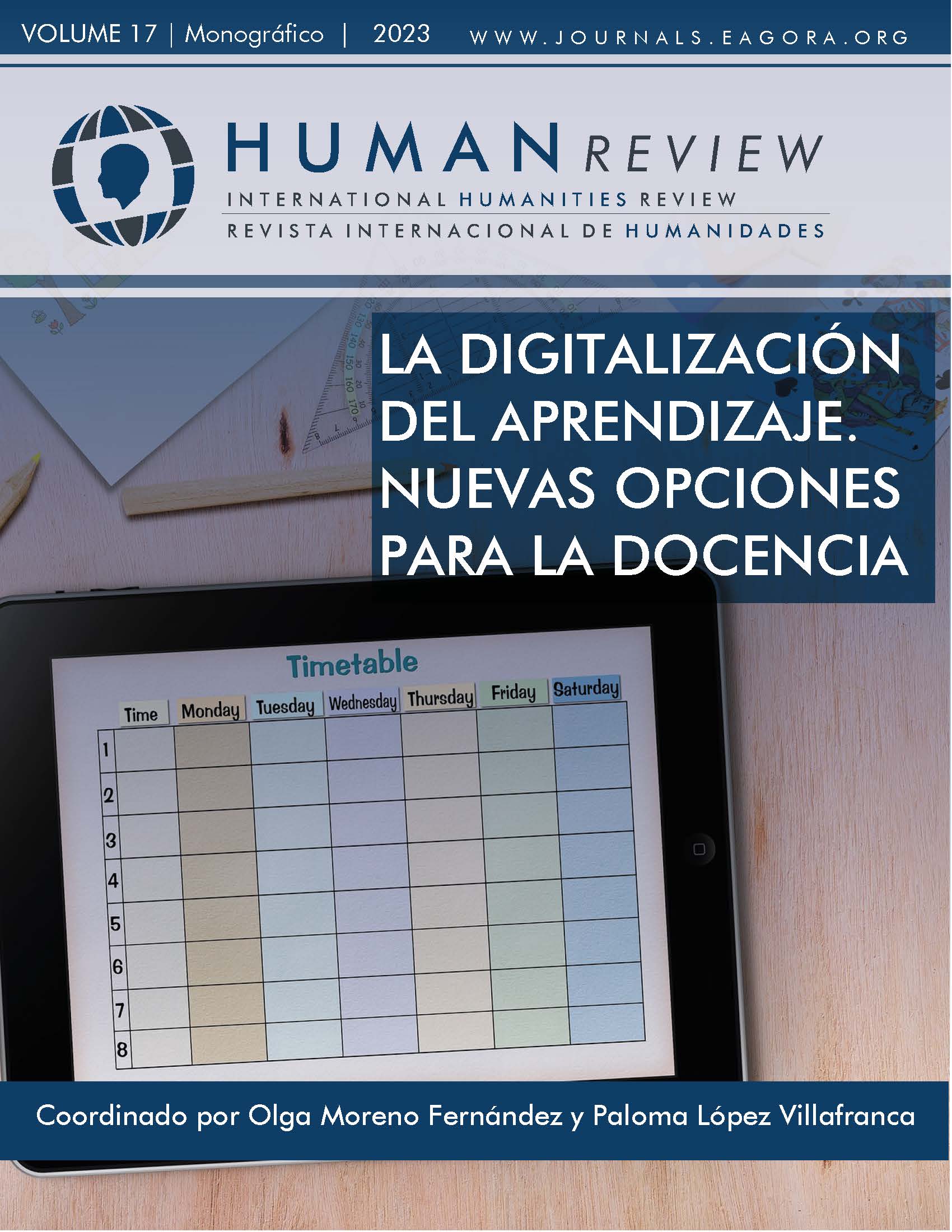M-learning as a tool for adaptive learning
A proposal for higher education
DOI:
https://doi.org/10.37467/revhuman.v12.4767Keywords:
Adaptive learning, M-learning, ICT, Educative technology, Mobile-DAbstract
In recent years, university education has been rapidly transformed, student performance, technological advances and the pandemic have generated new challenges. The adaptive learning is an alternative that can be implemented to identify academic strengths and weaknesses and together with the Information Technology applied to education is possible to improve the academic performance of students by making them protagonists of their learning.
This work aim to design an adaptive learning component model to facilitate the development of skills in the area of programming methodology.
References
Abrahamsson, P., Hanhineva, A., Hulkko, H., Ihme, T., Jäälinoja, J., Korkala, M., Koskela, J., Kyllönen, P., & Salo, O. (2004). Mobile-D: An agile approach for mobile application development. Proceedings of the Conference on Object-Oriented Programming Systems, Languages, and Applications, OOPSLA, 174–175. https://doi.org/10.1145/1028664.1028736
Adams Becker, S., Brown, M., Dahlstrom, E., Davis, A., DePaul, lKristi, Diaz, V., & Pomerantz, J. (2018). NMC Horizon Report 2018 Higher Education Edition. https://library.educause.edu/resources/2018/8/2018-nmc-horizon-report
Amendaño-Guarquila, R. E., & Guevara-Vizcaíno, C. F. (2021). M-learning la educación a través de pantallas a los + jóvenes en confinamiento. EPISTEME KOINONIA, 4(8), 308. https://doi.org/10.35381/e.k.v4i8.1358
Arce, J. R., Coba, J. P., & Pegueros, J. (2017). Impacto del m-learning en el proceso de aprendizaje: habilidades y conocimiento / The Impact Of m-learning On The Learning Process: Skills and Knowledge. RIDE Revista Iberoamericana Para La Investigación y El Desarrollo Educativo, 8(15), 363–386. https://doi.org/10.23913/RIDE.V8I15.303
Blasco-Serrano, A. C., González, I. B., & Coma-Roselló, T. (2022). Incorporación de las TIC en la formación inicial del profesorado mediante Flipped Classroom para potenciar la educación inclusiva. Edutec. Revista Electrónica de Tecnología Educativa, 79, 9–29. https://doi.org/10.21556/EDUTEC.2022.79.2393
Cardona, T. S. A., Valencia, C. M. L., & Jaramillo, V. S. (2020). Implementación y validación de una arquitectura para un entorno virtual adaptativo. Espacios, 41, 14–28. https://www.revistaespacios.com/a20v41n06/20410614.html
Chirino-García, R. C. & Hernández-Corona, J., 2020. M-learning: Estrategia para la promoción del aprendizaje electrónico móvil en instituciones de educación superior. EPISTEME KOINONIA, 3(5), pp. 1-12. http://portal.amelica.org/ameli/jatsRepo/258/2581039007/html/index.html
Crescenzi-Lanna, L., Valente, R., & Suárez-Gómez, R. (2019). Safe and inclusive educational apps: Digital protection from an ethical and critical perspective. Comunicar, 27(61), 88–97. https://doi.org/10.3916/C61-2019-08
Del Valle Mejías, M. E. (2020). Edmodo: una plataforma de e-learning para la inclusión. Revista de Comunicación de la SEECI, 52, 17-28. http://doi.org/10.15198/seeci.2020.52.17-28
Dziuban, C., Moskal, P., Parker, L., Campbell, M., Howlin, C., & Johnson, C. (2018). Adaptive learning: A stabilizing influence across disciplines and universities. Online Learning Journal, 22(3), 7–39. https://doi.org/10.24059/olj.v22i3.1465
Fombona, J., Pascual-Sevillano, M. A., & González-Videgaray, M. C. (2017). M-learning and augmented reality: A review of the scientific literature on the WoS repository. Comunicar, 25(52), 63–71. https://doi.org/10.3916/C52-2017-06
García Sánchez, M. del R., Reyes Añorve, J., & Godínez Alarcón, G. (2018). Las Tic en la educación superior, innovaciones y retos / The ICT in higher education, innovations and challenges. RICSH Revista Iberoamericana de Las Ciencias Sociales y Humanísticas, 6(12), 299–316. https://doi.org/10.23913/ricsh.v6i12.135
González, M., Benchoff, D., Huapaya, C., & Remon, C. (2017). Aprendizaje Adaptativo: Un Caso de Evaluación Personalizada. Revista Iberoamericana de Educación En Tecnología y Tecnología En Educación, 65–72.
Hernando Calvo, A. (2018). Escuelas del siglo XXI : comunidades de aprendizaje personalizado. Cuadernos de Pedagogía, 86–91. https://redined.educacion.gob.es/xmlui/handle/11162/184756
Lerís López, D., Vea Muniesa, F., & Velamazán Gimeno, Á. (2015). Aprendizaje adaptativo en Moodle: tres casos prácticos. Education in the Knowledge Society (EKS), 16(4), 138–157. https://doi.org/10.14201/eks201516138157
Leyva, A., Carreño, M., Estrada, I., & Ezpinoza, G. (2016). Desarrollo de una herramienta tipo m-Learning utilizando la metodología Mobile-D, como apoyo en el proceso enseñanza-aprendizaje de la programación lineal. Revista Colombiana de Computación, 17(1), 7–22.
López, C., & Bedolla Cornejo, L. P. (2020). El aprendizaje adaptativo para la regularización académica de estudiantes de nuevo ingreso: la experiencia en un curso remedial de matemáticas. Edutec. Revista Electrónica de Tecnología Educativa, 74, 206–220. https://doi.org/10.21556/edutec.2020.74.1627
Mascarell Paláu, D. (2020). Fomento del Mobile Learning en educación alrededor de la última década. Un estudio de caso en España través de una selección de aportaciones. Vivat Academia. Revista de Comunicación, 153, 73-97. https://doi.org/10.15178/va.2020.153.73-97
Molina Ríos, J. R., Honores Tapia, J. A., Pedreira-Souto, N., & Pardo León, H. P. (2021). Estado del arte: metodologías de desarrollo de aplicaciones móviles. 3C Tecnología_Glosas de Innovación Aplicadas a La Pyme, 10(2), 17–45. https://doi.org/10.17993/3ctecno/2021.v10n2e38.17-45
Olea, J., Abad, F. J., Ponsoda, V., & Carmen Ximénez, M. (2004). Un test adaptativo informatizado para evaluar el conocimiento de inglés escrito: diseño y comprobaciones psicométricas. In Psicothema (Vol. 16). www.psicothema.com
Pérez, X. O. P., & Crespo, E. J. R. (2022). TIC`s en la educación en contextos de disrupción tecnológica. RECIAMUC, 6(1), 139–148. https://doi.org/10.26820/RECIAMUC/6.(1).ENERO.2022.139-148
Pina, M. B. (2017). Diversidad educativa ¿Un potencial desconocido? Revista de Investigacion Educativa, 35(1), 15–33. https://doi.org/10.6018/rie.35.1.275031
Ramírez, H. M. (2021). Implementación de estrategias de Rapid E-Learning ante la pandemia. Dilemas Contemporáneos: Educación, Política y Valores, 9(1). https://doi.org/10.46377/DILEMAS.V9I1.2870
Riswan, R. (2022). The Design of Adaptive Learning Model to Support the Application of Blended Learning How to Cite. IRJE |Indonesian Research Journal in Education (Vol. 6), 58–70. https://doi.org/10.22437/irje.v6i1.10677
Santiago, R., & Trabaldo, Susana. (2015). Mobile Learning Nuevas Realidades en el Aula. Oceano Grupo Editoria, S.A.
Taylor, S., Bogdan, R., & DeVault, M. (2016). Chapter 3 Participant Observation : In the Field. Introduction to Qualitative Research Methods: A Guidebook and Resource, 54–95.
Torres Cañizález, P. C., & Cobo Beltrán, J. K. (2017). Tecnología educativa y su papel en el logro de los fines de la educación. Educere, 21(68), 31–40.
Zamora Delgado, R. (2019). M-learning, the advantages of using mobile devices in the aautonomous learning process. Revista de Ciencias Humanísticas y Sociales, 4(3), 29–38.
Downloads
Published
How to Cite
Issue
Section
License
Those authors who publish in this journal accept the following terms:
- Authors will keep the moral right of the work and they will transfer the commercial rights.
- After 1 year from publication, the work shall thereafter be open access online on our website, but will retain copyright.
- In the event that the authors wish to assign an Creative Commons (CC) license, they may request it by writing to publishing@eagora.org









